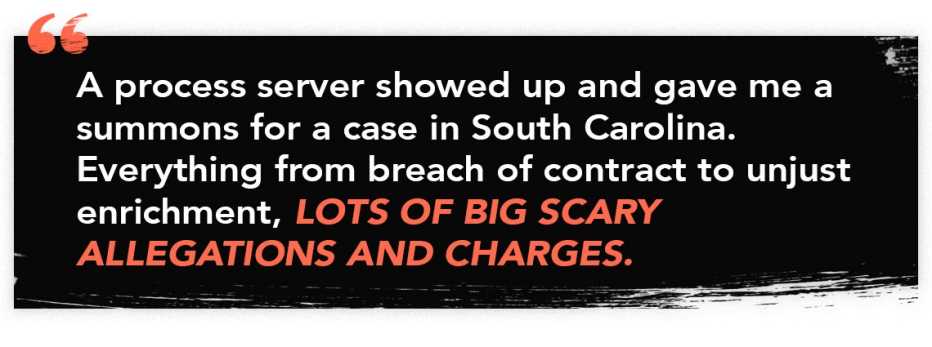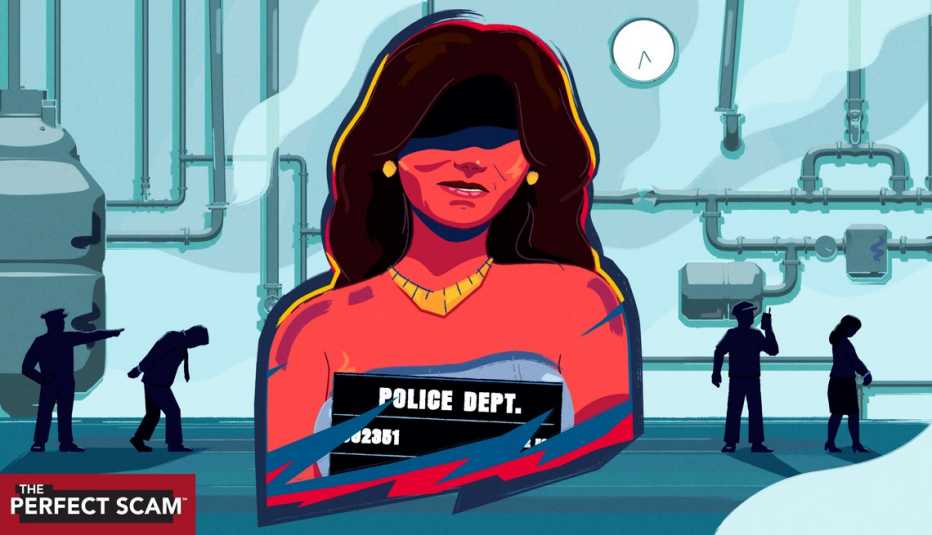Adivorceand a series of medical emergencies leave himstruggling financiallyand searching for some relief.
[00:00:04] I was in a bad situation financially.
I ju–, I couldn’t make the payments anymore.
(MUSIC SEGUE)
[00:00:39] Bob: Welcome back to The Perfect Scam.
I’m your host, Bob Sullivan.
But Michael is just one of many.

So here’s Michael who signed up like so many did after the terrorist attacks of 9/11.
I, I can’t really explain it in one particular reason.
Naturally, after 9/11 I think a lot of people were hit with a sense of patriotic duty.

He fought in the Pacific Theater around the Philippines and New Guinea.
I had two uncles on either side in the Vietnam era.
[00:02:50] Bob: Back when Michael joined, his paperwork didn’t actually go through until 2003.

Recruits generally saw action right away.
[00:03:15] Michael Haring: Oh sure, sure.
But I got sent to Germany, so it was Germany/Iraq.
[00:03:37] Bob: And what were you doing in Iraq?
[00:03:41] Michael Haring: Understand that by trade I was an artilleryman.
I actually worked the fire direction center.
So that for like targeting systems uh for field artillery and uh, combined arms operations.
But when we got to Iraq, naturally we were all infantry.
So we connected with uh 810 Cavalry, and they made cav scouts out of us.
Although I was artillery by trade, the only artillery I ever saw in combat was incoming.
[00:04:30] Bob: Um, you were part of a team searching or clearing IEDs, no?
(chuckles) That’s just kind of how life was at that point during the conflict.
[00:05:11] Bob: IEDs.
It was a forward operating base called FOB Falcon.
And that was a super rural area, but I can tell you everybody around there hated us.
So the vast majority of IED encounters that I had were around that outpost.
Or, or how do you do this?
We had things that we had to look out for.
I was always on point.
We didn’t really have any specific counter IED equipment.
It was just our own eyes, our own feelings, and our own training.
You, you see a pile of dirt on the side of the road that looks suspicious?
Or how, how does that work?
So all told I hit six IEDs during my tour.
Six of them found me before I found it.
So what had happened is it was late in the evening.
It was getting dark.
It was called Route Jackson.
And because it was nearing the end of our patrol, we had to head back to the base.
We did kind of a short loop.
And then all of a sudden, those trucks were gone.
Like they just disappeared.
Sure enough, yeah, it’s, it’s an IED.
[00:11:32] Bob: Hmm.
[00:11:33] Michael Haring: Yeah.
It didn’t work out that way for them but uh, I was fortunate that evening.
[00:11:39] Bob: Wow.
[00:11:40] Michael Haring: Yeah.
[00:11:53] Michael Haring: Usually.
I mean there was always something, but you know usually nothing of consequence.
And that was just, that was just the nature of, of the conflict at the time.
I mean they; they didn’t know.
It took a long time to be able to adjust away from that sort of hyperawareness.
And the vehicle that was in front of me backfired, violently backfired.
I mean smoke and flame and everything, and I went right into Baghdad mode.
It was, it was hard to deal with.
This is something that my body and my mind still reacts to.
And that was relatively soon after getting out of active duty.
These are some things that may trigger these emotions, and this is why it’s happening.
That’s, that’s unfortunate.
Um, I did a lot of work.
[00:15:01] Michael Haring: Well you’re absolutely right.
I mean the, it was just like combat.
I mean it, it only lasts oftentimes for a very short while.
It may take much longer to fully come down from that and regroup and, and get yourself straight.
(chuckles)
[00:15:33] Bob: Yeah, God.
[00:15:34] Michael Haring: Yeah.
Combined with all that, the cost of living in Colorado had started to skyrocket.
So you know my financial difficulties, uh they certainly didn’t make things any easier.
He’s getting about $1600 a month.
My son was 12 at the time, and he was now living with me 100%.
[00:17:39] Michael Haring: Yeah, there were some pretty astronomical expenses associated with that.
Yeah, I was in a bad situation, a bad situation financially.
And one of the results was for a company called Voyager Financial Group.
[00:18:23] Bob: Voyager Financial Group.
The firm’s website says it offers creative financial help for veterans who are suffering from financial distress.
Desperate, Michael clicks to find out more and eventually calls them.
And that that cash advance could be paid back over a period of X number of years.
One term for this kind of arrangement is a structured cash flow.
So Michael decides to trade in much of his monthly disability payment for this instant financial relief.
[00:20:01] Bob: And for that, they gave you 20 something thousand dollars.
[00:20:13] Bob: But before he gets the money, there are a couple of other requirements.
I said, “Yeah, it’s only about, you know, three grand.”
Yeah, it was just really, really bizarre the way they had it set up.
After Voyager takes its monthly slice, Michael gets a check for what remains, about two weeks later.
[00:21:15] Bob: What did you use this money for?
[00:21:17] Michael Haring: This money was used immediately for debts that had to be paid.
I know, I mean I was struggling uh to keep my electricity on.
Everything that I had outstanding that I could pay with that, I paid.
[00:21:36] Bob: But the relief is temporary, very, very temporary.
Within months he can’t survive on those reduced payments and his new salary.
So you know it, it really was a, an untenable situation.
And so I’ll have the VA send it right to me.
I’ll take the payments that are supposed to go to that investor.
I would send those in directly.
That payment is made.
But even that could only be kept up for so long.
I just, I couldn’t make the payments anymore.
[00:23:34] Bob: So Michael starts missing his payments and there are consequences almost immediately.
The medical bills, the childcare, the loan payments, and the lawsuit are all too much.
And Michael makes the difficult decision to declare bankruptcy.
As far as he knows, that should discharge the debt owed to Voyager Financial.
But it’s not that simple.
Here’s the date.
You know it, everything was above the table.
I’m like this has, this has been discharged.
This is done, this is over with.
And I guess Upstate Law Group didn’t agree.
They didn’t agree.
[00:26:30] Bob: Why are we even here?
Up to this point he’d represented himself.
And he finds something shocking in his research.
What does he find and how many other veterans are caught up in the same situation as Michael?
Well that’s next week on The Perfect Scam.
Call the AARP Fraud Watch internet Helpline at 877-908-3360.
Their trained fraud specialists can provide you with free support and guidance on what to do next.
That address again is: theperfectscampodcast@aarp.org.
Be sure to find us on Apple Podcasts, Spotify, or wherever you listen to podcasts.
For AARP’s The Perfect Scam, I’m Bob Sullivan.
